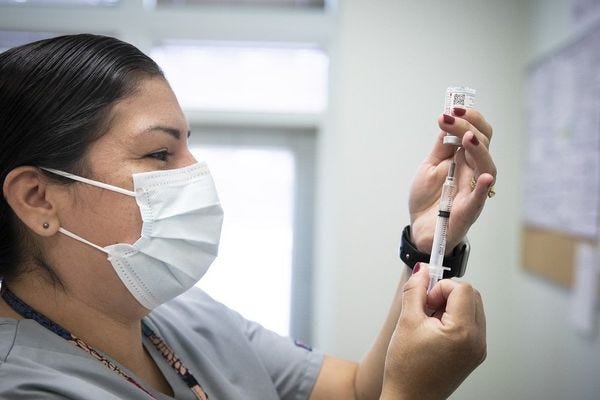FDA Approves Second Bivalent Booster Shots For Some, Tiny American Flags For Others
There was a thing, children, it was called 'pandemic.'
The Food and Drug Administration has approved a second dose of the updated COVID booster shot that came out last fall, for older people and folks with compromised immune systems. That would be the "bivalent" boosters that were developed to protect against the original virus and the Omicron variant of the virus. The booster will be available to people over the age of 65 four months after their last dose, and to those with weakened immune systems two months after their last shot. Those guidelines apply to both the Moderna and the Pfizer-BioNTech boosters.
On top of that, the FDA authorized making the updated vaccines the standard for all COVID vaccines from here on in, which means that anyone who hasn't been vaccinated yet will get a single dose of the Pfizer or Moderna vaccine instead of the two-dose vaccines that were originally rolled out in December 2020.
Next, the Centers for Disease Control and Prevention will meet with its vaccine advisory panel on Wednesday; once the CDC signs off on the new second dose plan, boosters can begin being given immediately.
As always, anti-vaxxers are still recommended to take a daily helping of STFU.
So far, the CDC says that only around 42 percent of Americans over 65 have received a first dose of the bivalent booster, and while virtually all Americans are able to get it, fewer than 17 percent of us have done so.
The Washington Post notes that the health agencies "will not formally urge that people get a second booster. Instead, the 'permissive' policy says they may get a second dose if they want."
Experts have expressed differing views on the necessity of a second bivalent dose. While some say little data exists to justify it, others believe the extra shot is a good option for high-risk individuals. The United Kingdom and Canada already are offering spring booster shots for vulnerable individuals.
Since the effectiveness of the COVID vaccine wanes over time, you may as well get the second bivalent booster if you qualify, and you should definitely get a first one if you haven't yet, since the vaccine has a good safety record and does a good job of protecting against hospitalization and death.
NBC News points out that while the two Omicron subvariants the bivalent vaccines were designed to protect against are no longer circulating in the US, the vaccines still offer pretty good protection against the current prevalent strain, another Omicron subvariant called XBB.1.5:
A CDC report published in January found that the updated Covid boosters reduced the risk of Covid infection from the XBB.1.5 subvariant by nearly half. Another study, published by Israeli researchers in the Lancet this month , found that the Covid boosters reduced the risk of hospitalization in people 65 and older by 72%. Neither study, however, looked at the effects of receiving two doses of the bivalent booster.
Going forward, the Post says that the FDA still plans to recommend that people get a COVID vaccine annually, in the fall when they get their flu vaccine:
The FDA and its advisers hope the simplified schedule will encourage more people to get coronavirus vaccine doses. Officials will select a reformulated dose in coming months based on which coronavirus strain scientists think is most likely to be circulating in fall and winter.
Under that blueprint, most people, whether vaccinated or not, would be urged to receive a single annual dose of a coronavirus shot.
Even though Congress hasn't authorized updated funding for COVID programs, the Post reports the shots will remain free of cost regardless of whether eligible people have insurance or not, since the "government has an ample supply." Should that supply be exhausted, people with health insurance will still get free shots, but people on private insurance will want to make sure their providers are in network. The uninsured may have to pay, though, unless more funding comes from Congress. Freaking America, man.
[ NBC News / WaPo / Image: Gov. Tom Wolf , Creative Commons License 2.0 ]
Yr Wonkette is funded entirely by reader donations. If you can, please give $5 or $10 monthly so we can keep this little mommyblog rolling right along.
Do your Amazon shopping through this link, because reasons .




Anyone who refuses the vaccine then dies of covid got what they deserved.
Would still encourage people to take their goddamn Vitamin D (4000 IU or whatever your doctor recommends), but fortunately, these days the vaccines and Paxlovid are how you stay on top of COVID. The Vitamin D helps with resistance to COVID -- probably -- but it's a bit player in the game.
That said, your body needs Vitamin D, the capsules are cheap, you stand a strong chance of being Vitamin D deficient if you're not actively keeping up on it, so why not.